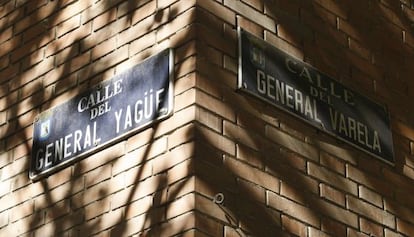Madrid City Hall to change street names linked to Franco regime
New leftist Ahora Madrid government wants to comply with Historical Memory legislation

Madrid City Hall has announced that it is moving forward to remove all names relating to the regime of former dictator Francisco Franco from the Spanish capital’s streets and squares.
Rita Maestre, city council spokeswoman for the ruling Ahora Madrid party, said that new Mayor Manuela Carmena would fulfill her campaign pledge to remove all remaining public symbols of the former dictatorship. The move is in compliance with the 2007 Historical Memory Law, which was passed by the Socialist government of Prime Minister José Luis Rodríguez Zapatero.
One group does not want a repeat of a 2005 incident when a statue of Franco was removed in secret
The previous Popular Party (PP) administrations that have governed City Hall since the law was passed made no effort to change street or square names that served as reminders or held some type of connection to the Franco dictatorship.
In December 2004, the United Left (IU) coalition on the city council introduced a measure calling for the removal of all street names associated with the Franco government. However, the proposal was rejected by the PP, which had the majority at the time.
Then-Deputy Mayor Manuel Cobo explained that it was stupid to erase “40 years of history.”
Mayor Carmena and her leftist Ahora Madrid bloc have been in power in City Hall for less than a month. The group has acknowledged that there is not yet “any specific plan to remove the street signs.”
The old regime in 167 streets
There is no official list. In 2004, a group from the United Left (IU) coalition prepared a list of names of streets and squares that needed to be changed based on a 1997 study.
Doubtful names. Although some streets have a direct relationship with Franco – such as those named after Generals Moscardó and Fanjul – there is more doubt over others, such as the street named after Agustín de Foxá, who was a Falangist, but also a famous poet, writer and journalist.
“We are still evaluating how to apply the Historical Memory Law, which we believe is not being used 100 percent,” Maestre said, adding that city officials would welcome suggestions from the public for new names to replace those on the streets and squares affected.
“In any case, we will change the names that are not in line with the state law on Historical Memory. We want a coordinated effort between neighborhoods and social entities,” she said.
Among the names likely to be submitted for review include Calle de los Caídos de la División Azul (The Fallen of the Blue Division street), located near Duque Pastrana Metro station, which was named in honor of Franco’s Blue Division forces, which fought alongside the Nazis between 1941 and 1943.
Another is Plaza de Arriba España, located next to Berlin park in Chamartín – “Arriba España” (Up with Spain) was the slogan of the Spanish Falange slogan that was officially adopted by the Franco regime in 1947.
As well as streets and squares, a number of municipal education and sports centers also carry the names of figures connected to the Franco dictatorship, such as the Eijo Garay school – named after the bishop of Madrid-Alcalá, who was also an official with the regime’s JONS national syndicalist movement and a member of the Franco-backed parliament.
The names have been compiled in a report by the Association for the Recovery of Historical Memory, which also includes a street named after Juan Ignacio Luca de Tema, the former editor of the conservative Abc newspaper, according to Europa Press.
This time the association is asking that the changes not be done in secret, as occurred in 2005 when a statue of Franco was removed from the capital’s Nuevos Ministerios area “overnight without any prior warning.” The group also wants the city to provides its reasoning for changing certain names.
At the same time, association members are asking for the “removal of public spaces dedicated to those who tried to lead a coup or used violence to ascend to power,” according to a statement.
Socialist spokesman at City Hall Antonio Miguel Carmona said his party backed Ahora Madrid’s plan. “It was the Socialists who introduced the Historical Memory Law,” he said.
Translation by Martin Delfin.
Tu suscripción se está usando en otro dispositivo
¿Quieres añadir otro usuario a tu suscripción?
Si continúas leyendo en este dispositivo, no se podrá leer en el otro.
FlechaTu suscripción se está usando en otro dispositivo y solo puedes acceder a EL PAÍS desde un dispositivo a la vez.
Si quieres compartir tu cuenta, cambia tu suscripción a la modalidad Premium, así podrás añadir otro usuario. Cada uno accederá con su propia cuenta de email, lo que os permitirá personalizar vuestra experiencia en EL PAÍS.
¿Tienes una suscripción de empresa? Accede aquí para contratar más cuentas.
En el caso de no saber quién está usando tu cuenta, te recomendamos cambiar tu contraseña aquí.
Si decides continuar compartiendo tu cuenta, este mensaje se mostrará en tu dispositivo y en el de la otra persona que está usando tu cuenta de forma indefinida, afectando a tu experiencia de lectura. Puedes consultar aquí los términos y condiciones de la suscripción digital.








































